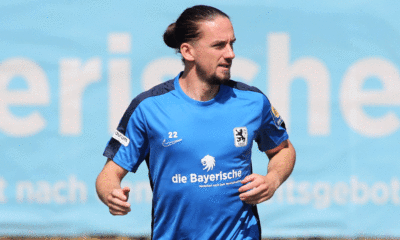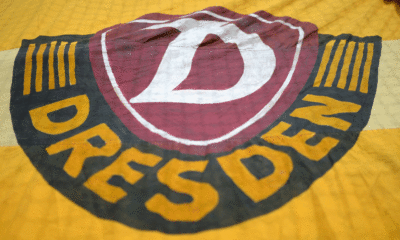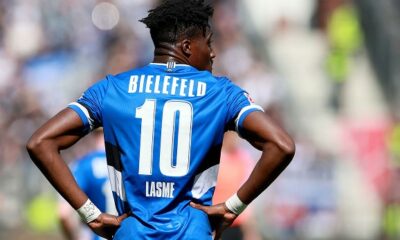Bundesliga
“My impression of Germany was not exactly rosy”
Published
2 years agoon
By
Maria Keane
Bo Svensson has been back at 1. FSV Mainz 05 since the beginning of the year. The Danish head coach sensationally led the club out of the table cellar in the previous season and is currently playing a good role in the Bundesliga with the zero fives.
In an interview with SPOX and GOAL, Svensson talks about his tough early days as a player in Germany and the experience under Thomas Tuchel in Mainz.
The 42-year-old also talks about his literature studies and explains how he became a trainer differently than expected.
Mr. Svensson, after winning three championships and a cup victory with FC Copenhagen, you moved abroad for the first time at the age of 26 and joined Borussia Mönchengladbach in January 2006. Why?
Bo Svensson: My contract was running out and I didn’t want to renew it because, in my mid-twenties and after seven years at the club, I was of the opinion that this was the right time to move abroad. It would also have been difficult for me to move to a big league without a free transfer. There were several offers from Germany – including from Borussia Mönchengladbach. Gladbach is a big club and I had a good feeling after talking to those responsible.
How was it with the language in the beginning?
Svensson: I had German lessons at school, but that didn’t mean I could speak it well. In Gladbach we had a rather international group in which we communicated mainly in English. I didn’t learn German until later in Mainz.
The time with the foals was not a good star, the club did not come to rest. At that time you also played under Jupp Heynckes for some time. How do you remember him?
Svensson: When he came there were already some problems within the club. It just didn’t go smoothly. I remember Jupp Heynckes as a very good person, but who did not have the player material to implement his idea of football. After all, he left the club under unfortunate circumstances.
Gladbach then rose under the previous assistant coach Jos Luhukay in 2007. Just like Mainz 05, your next club. When exactly was the change made?
Svensson: Only after the descent with Gladbach. At first I thought about going back to Denmark. I was the father of two small children and my impression of Germany was not exactly rosy. I also had offers from home, but also one from Mainz. I then phoned Jürgen Klopp for a long time and went to Mainz on my vacation. After talking to him personally, I was sure that I would like to try it here.
What impression did Christian Heidel and Klopp make on you at the beginning?
Svensson: Each one very positive. With Christian Heidel it was more about contractual issues. Jürgen Klopp had a clear idea and I have the feeling that this also suits me in terms of personality. That was the reason why I saw a future here not only for myself, but also for my family.
Because of problems with the Achilles tendon, you only started six times in your first season. Mainz tragically missed the promotion for the second time as fourth. How did you rate the year for yourself?
Svensson: It was’nt easy. I constantly struggled with my Achilles tendon without a proper diagnosis and didn’t play a lot. We have long tried to combat the problems by other means than surgery. But that didn’t work. I lost a lot of time before a doctor discovered that I had a partial tear in the Achilles tendon. Treatment with injections is less likely to help.
The operation followed and a long break. How close have you been to an early retirement in the meantime?
Svensson: It is normal to start pondering if you don’t know where the pain is coming from for a long time. In addition, there was the very long rehab process, in which it went up and down again and again – of course, you also have doubts. It took about ten months before I was able to play again, but I never actually had the basic feeling that it was no longer possible. At the end of the 2009 season, I was able to play a few important games, such as the away win in Fürth or the home win against Oberhausen, which then meant promotion.
So in your second season in Mainz you still made twelve competitive games. After a cup failure in Lübeck, the club surprisingly split from Jörn Andersen and Thomas Tuchel, the previous A-youth coach, took over. How skeptical were you?
Svensson: It was unusual, to dismiss the promotion coach so shortly before the start of the season. If there was any skepticism at all, it was gone within a few days, as each of us realized very quickly that Thomas Tuchel is an absolute specialist and a real leader. It quickly became clear that he was taking a completely different approach in all areas: in training, tactics, leadership. I didn’t know that before. It was very interesting and it stayed that way for the next five years.
Tuchel is very demanding and can be very tough and direct to his players. This is not for everyone. How was it with you?
Svensson: Of course, there are also conflicts when you work together for so long. He also put me on the bench or gave me a real enema and then you had a brief argument, but that wasn’t bad. That gave me a lot and was good for me as a person and as a footballer. I improved in all areas under him and, above all, understood the game better. I could read it much faster and better anticipate things on the court. For example, despite my not exactly high speed, I learned to stand tall and defend forward boldly.
Under Tuchel you advanced to become a regular, had to take a break due to a cruciate ligament rupture and by the end of your career in 2014 you had 122 competitive games for Mainz. If someone had told you back then that you would have been working as a trainer immediately afterwards and to this day, what would you have replied?
Svensson: I probably wouldn’t have believed that. In my entire playing career, I never thought I’d stay in the football industry. Especially towards the end of my active time, I didn’t enjoy the whole professional everyday life as much: the fast paced life, life on the hamster wheel, having the same processes week after week, you don’t have a weekend, you always have to be available, everything works out only rated based on what happened in the last 90 minutes. I just didn’t have that much fun anymore. So I thought I would do something completely different afterwards in order to experience something new again.
And what do you say today?
Svensson: Everything is very similar to back then. (laughs)


Test match tournament on free TV and live stream
In preparation for the upcoming start of the season in the 2nd and 3rd divisions, SpVgg Unterhaching is organizing a...


Test match on free TV and live stream
Third division club Dynamo Dresden are testing today against top Czech club Slavia Prague in preparation for the upcoming start...


When does the season start?
It’s warm and sunny outside, but you just want to watch football again? Then get in the mood for the...

